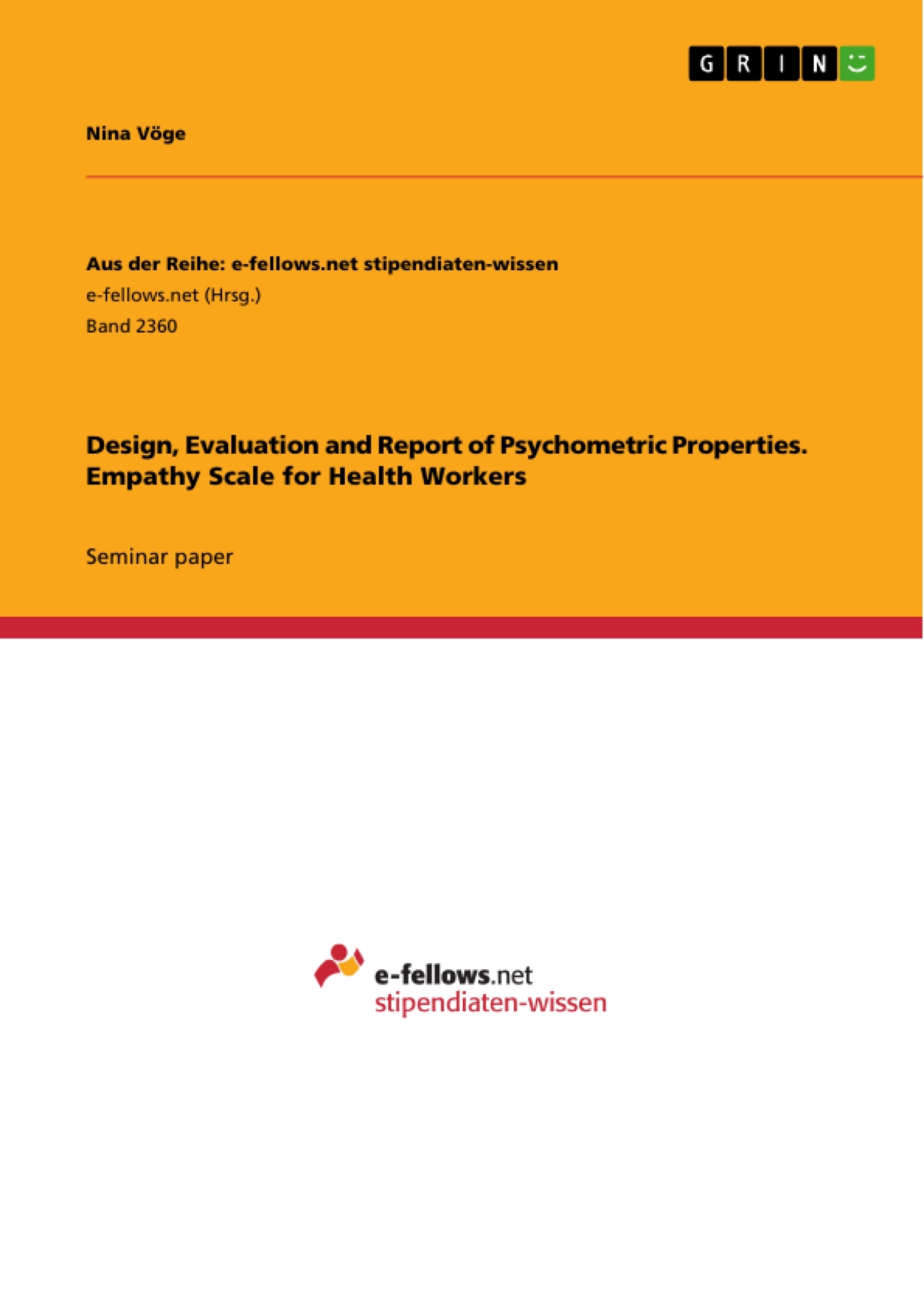A report about the design and evaluation of a psychometric scale focusing on empathy in health care workers recruitment.
Various personality traits contribute to the uniqueness of a person. However, certain traits are more important when working in certain sectors. With regard to the healthcare sector evidence suggests that empathic behaviour has a positive impact on healthcare outcomes and plays an important role in the everyday working environment of the healthcare professional. Therefore, having psychometrically sound empathy scales is highly important for the assessment of care-workers
Inhaltsverzeichnis (Table of Contents)
- Item Generation
- Benchmarking & Content Validation
- Questionnaire Administration
- Initial Item Reduction
- Structural Validity
Zielsetzung und Themenschwerpunkte (Objectives and Key Themes)
The main objective of this report is to develop a psychometrically sound scale for measuring emotional empathy in care-workers, focusing on the specific needs of recruiting and assessing candidates for roles involving elderly care. This scale aims to be concise and effective, facilitating a more efficient selection process.
- Development of a statistically valid emotional empathy scale for care-worker assessment
- Focus on emotional empathy as a key aspect of successful care-worker performance
- Evaluation of the scale's psychometric properties, including content validity, construct validity, and reliability
- Application of the scale in the screening process for care-worker candidates
- Optimization of the scale's effectiveness for use in time-constrained recruitment scenarios
Zusammenfassung der Kapitel (Chapter Summaries)
- Item Generation: This chapter outlines the process of creating items for the emotional empathy scale, drawing upon existing literature and defining the construct of emotional empathy. The authors discuss the importance of ensuring the items assess relevant aspects of empathy and the consideration of factors such as vocabulary and length to ensure suitability for the target audience.
- Benchmarking & Content Validation: This chapter focuses on the process of validating the scale items, using the Big-Five Inventory-10 scale as a benchmark to identify potential correlations between empathy and other personality traits. The authors highlight the importance of expert input and describe the use of subject-matter experts to assess the relevance and content validity of the items.
- Questionnaire Administration: This chapter describes the administration of the questionnaire containing the scale items and the benchmark scale. The authors explain the rationale behind the online administration and discuss the sample size considerations in ensuring adequate data for subsequent analysis.
- Initial Item Reduction: This chapter discusses the process of using factor analysis to reduce the number of items in the scale while ensuring the validity and integrity of the construct being measured. The authors highlight the significance of statistical analysis in identifying relevant factors and providing evidence of construct validity.
Schlüsselwörter (Keywords)
This report focuses on the assessment of emotional empathy in the context of care-worker recruitment. Key terms and concepts include emotional empathy, psychometric properties, scale development, factor analysis, content validity, construct validity, and care-worker performance.
Frequently Asked Questions
What is the purpose of the Empathy Scale for Health Workers?
The scale is designed to assess emotional empathy in healthcare professionals during recruitment, specifically for roles involving elderly care.
Why is emotional empathy important in healthcare?
Evidence suggests that empathic behavior by health workers leads to better healthcare outcomes and a more positive working environment.
How was the empathy scale validated?
The scale underwent content validation through expert input and benchmarking against the Big-Five Inventory-10 scale to check for correlations with other personality traits.
What statistical method was used for item reduction?
Factor analysis was employed to reduce the number of items while maintaining the construct validity and reliability of the scale.
Can this scale be used in time-constrained scenarios?
Yes, one of the objectives was to create a concise and effective scale suitable for rapid screening in recruitment processes.
What is "construct validity" in psychometrics?
Construct validity ensures that the test actually measures the psychological trait (in this case, emotional empathy) it claims to measure.
- Quote paper
- Nina Vöge (Author), 2017, Design, Evaluation and Report of Psychometric Properties. Empathy Scale for Health Workers, Munich, GRIN Verlag, https://www.grin.com/document/368479



